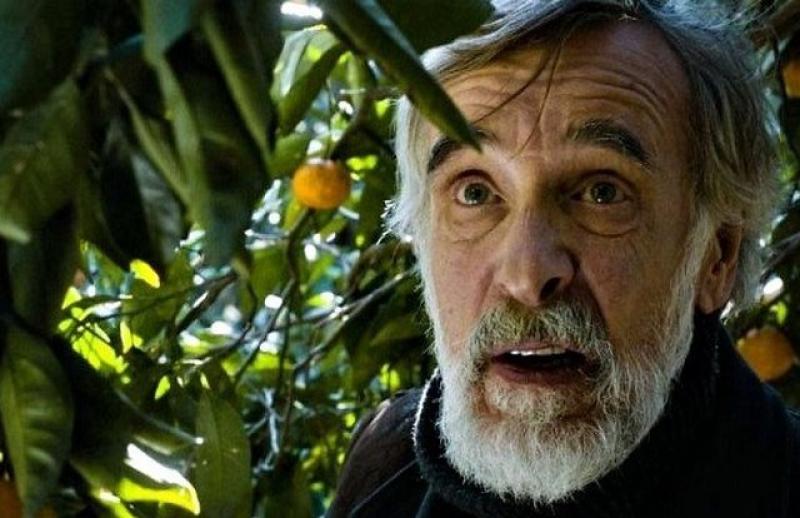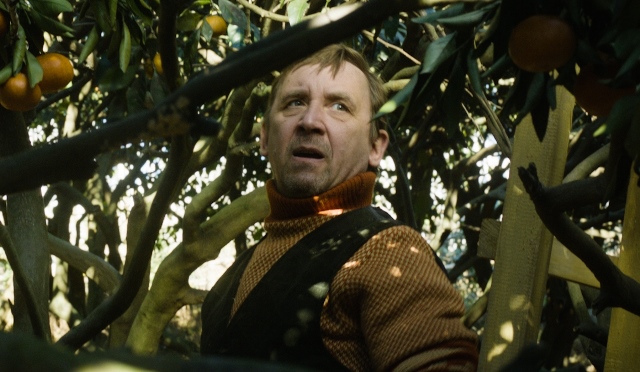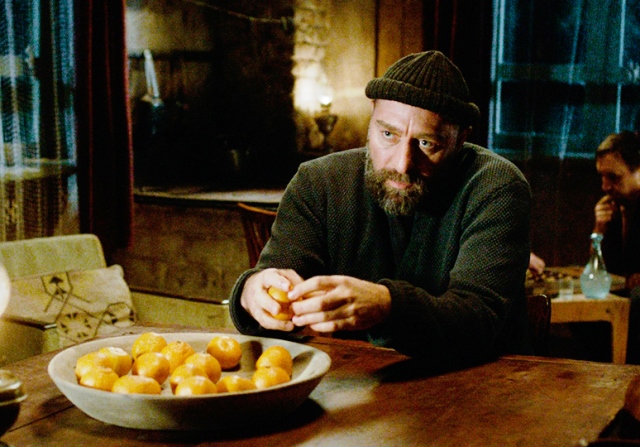Tangerines | reviews, news & interviews
Tangerines
Tangerines
Affecting Oscar-nominated Estonian-Georgian plea for tolerance

Tangerines has a simple premise which is executed straightforwardly. Yet it proves affecting to a degree seemingly out of proportion to the proposition behind the film. A man living in a war zone finds that the conflict has, literally, come to his door. He takes in an injured survivor from each of the opposing sides and, as they come back to health, steers them to confront and accept each other’s humanity. Where there was neither, tolerance and respect are cultivated.
And that's it, the plot of Georgian director Zaza Urushadze’s Tangerines. The film’s impact stems from the subtlety of the interaction between its four outstanding players. Nothing is forced, nothing is overplayed. Everything unfolds with an organic verisimilitude which is both absorbing and moving. This is an anti-war film with a pacifist message, but it does not shy away from the thin lines between violence and peace. Hair-triggers are never far.
 The setting for Tangerines is 1992, during the war between Georgia and its separatist region Abkhazia. This is where Ivo (veteran Estonian actor Lembit Ulsak) and his friend and neighbour Margus (Elmo Nüganen, pictured right) live in a remote village. Estonian émigrés, they have remained there during the conflict to harvest what will probably be the last crop of tangerines. They are the only Estonians left – everyone else from their transplanted community has returned home. Both are stubborn, and each has the even keel which age brings. Ivo makes wooden crates while Margus, on his own as there is no labour, attempts to pick the fruit before it spoils.
The setting for Tangerines is 1992, during the war between Georgia and its separatist region Abkhazia. This is where Ivo (veteran Estonian actor Lembit Ulsak) and his friend and neighbour Margus (Elmo Nüganen, pictured right) live in a remote village. Estonian émigrés, they have remained there during the conflict to harvest what will probably be the last crop of tangerines. They are the only Estonians left – everyone else from their transplanted community has returned home. Both are stubborn, and each has the even keel which age brings. Ivo makes wooden crates while Margus, on his own as there is no labour, attempts to pick the fruit before it spoils.
Ivo’s house has a road in front of it which becomes the setting for a firefight between the opposing sides. Everyone is killed except for Ahmed (Giorgi Nakashidze, below left), a Chechen mercenary fighting for Abkhazia, and Niko (Mikheil Meskhi), a Georgian. Ivo and Margus bury the dead and bring the survivors into the house.
 Both fighters are severely wounded but each begins a slow recovery despite the slanging and violence which increases between them as they gain strength. Ivo gets the enemies to agree to not kill each other under his own roof. While the opposing pair grow to respect each other and develop a mutual fondness, the war continues. In the end, with tragic results, it cannot be kept at bay.
Both fighters are severely wounded but each begins a slow recovery despite the slanging and violence which increases between them as they gain strength. Ivo gets the enemies to agree to not kill each other under his own roof. While the opposing pair grow to respect each other and develop a mutual fondness, the war continues. In the end, with tragic results, it cannot be kept at bay.
Ulsak is magisterial as Ivo. He is a man with good on his side and at his core who wishes to see it in others. He supports the more fatalistic but hopeful Margus, but it is clear the harvest is never going to be brought in. Despite his declared intention to kill Niko, Nakashidze steers his character Ahmed though anger, bellicosity, bluster and macho posturing which all give way to a warmth. As Niko, Meskhi (pictured below right) is also oppositional and initially the more reserved of the two survivors, but begins revealing a reflective personality. Before the conflict, he was an actor – a past which engenders some pithy lines about the nature of fictional depictions of war.
 As well as his sure hand with the film’s actors, unfolding mood and trajectory, Urushadze has a rare eye for set-ups. The compositions, indoor and outdoor, are painterly – vintage Peter Greenaway comes to mind, as does the precision of Nuri Bilge Ceylan.
As well as his sure hand with the film’s actors, unfolding mood and trajectory, Urushadze has a rare eye for set-ups. The compositions, indoor and outdoor, are painterly – vintage Peter Greenaway comes to mind, as does the precision of Nuri Bilge Ceylan.
Tangerines is an Estonian-Georgian co-production and was nominated in the 2014 Oscars as best foreign-language film. The award went to Ida, another film looking at the human and personal consequences of war. With Urushadze’s film though, the conflict is more recent than World War II. It cannot be coincidental that Tangerines is set in the year after the serially occupied Estonia peacefully achieved independence from the Soviet Union. It is a reminder that such a clean break was, and still is, a rarity.
The wonderful, sensitive Tangerines is a plea for tolerance – an appeal which should always be heard. It is a must-see.
Overleaf: watch the trailer for Tangerines
Watch the trailer for Tangerines
Add comment
The future of Arts Journalism
You can stop theartsdesk.com closing!
We urgently need financing to survive. Our fundraising drive has thus far raised £33,000 but we need to reach £100,000 or we will be forced to close. Please contribute here: https://gofund.me/c3f6033d
And if you can forward this information to anyone who might assist, we’d be grateful.

Subscribe to theartsdesk.com
Thank you for continuing to read our work on theartsdesk.com. For unlimited access to every article in its entirety, including our archive of more than 15,000 pieces, we're asking for £5 per month or £40 per year. We feel it's a very good deal, and hope you do too.
To take a subscription now simply click here.
And if you're looking for that extra gift for a friend or family member, why not treat them to a theartsdesk.com gift subscription?
more Film
 The Accountant 2 review - belated return of Ben Affleck's lethal bean-counter
Horror, humour and mind games combine in Gavin O'Connor's sequel
The Accountant 2 review - belated return of Ben Affleck's lethal bean-counter
Horror, humour and mind games combine in Gavin O'Connor's sequel
 The Ugly Stepsister review - gleeful Grimm revamp
A cutting Norwegian take on Cinderella and her adversaries
The Ugly Stepsister review - gleeful Grimm revamp
A cutting Norwegian take on Cinderella and her adversaries
 April review - powerfully acted portrait of a conflicted doctor in eastern Georgia
Dea Kukumbegashvili's second film is stylistically striking and emotionally raw
April review - powerfully acted portrait of a conflicted doctor in eastern Georgia
Dea Kukumbegashvili's second film is stylistically striking and emotionally raw
 theartsdesk Q&A: filmmaker Miguel Gomes on his latest exotic opus, 'Grand Tour'
The Portuguese director's comic melodrama takes a fantastical journey through Southeast Asia and the history of cinema
theartsdesk Q&A: filmmaker Miguel Gomes on his latest exotic opus, 'Grand Tour'
The Portuguese director's comic melodrama takes a fantastical journey through Southeast Asia and the history of cinema
 Neil Young: Coastal review - the old campaigner gets back on the trail
Young's first post-Covid tour documented by Daryl Hannah
Neil Young: Coastal review - the old campaigner gets back on the trail
Young's first post-Covid tour documented by Daryl Hannah
 The Penguin Lessons review - Steve Coogan and his flippered friend
P-p-p-pick up a penguin... few surprises in this boarding school comedy set in Argentina during the coup
The Penguin Lessons review - Steve Coogan and his flippered friend
P-p-p-pick up a penguin... few surprises in this boarding school comedy set in Argentina during the coup
 Blue Road: The Edna O'Brien Story - compelling portrait of the ground-breaking Irish writer
Glitz and hard graft: Sinéad O'Shea writes and directs this excellent documentary
Blue Road: The Edna O'Brien Story - compelling portrait of the ground-breaking Irish writer
Glitz and hard graft: Sinéad O'Shea writes and directs this excellent documentary
 DVD/Blu-ray: In a Year of 13 Moons
UK disc debut for Fassbinder's neglected, tragic, tender trans tale
DVD/Blu-ray: In a Year of 13 Moons
UK disc debut for Fassbinder's neglected, tragic, tender trans tale
 The Amateur review - revenge of the nerd
Remi Malek's computer geek goes on a cerebral killing spree
The Amateur review - revenge of the nerd
Remi Malek's computer geek goes on a cerebral killing spree
 Holy Cow review - perfectly pitched coming-of-age tale in rural France
Debut feature of immense charm with an all-amateur cast
Holy Cow review - perfectly pitched coming-of-age tale in rural France
Debut feature of immense charm with an all-amateur cast
 Patrick McGilligan: Woody Allen - A Travesty of a Mockery of a Sham review - New York stories
Fair-minded Woody Allen biography covers all bases
Patrick McGilligan: Woody Allen - A Travesty of a Mockery of a Sham review - New York stories
Fair-minded Woody Allen biography covers all bases

Comments
Best film ever seen for post